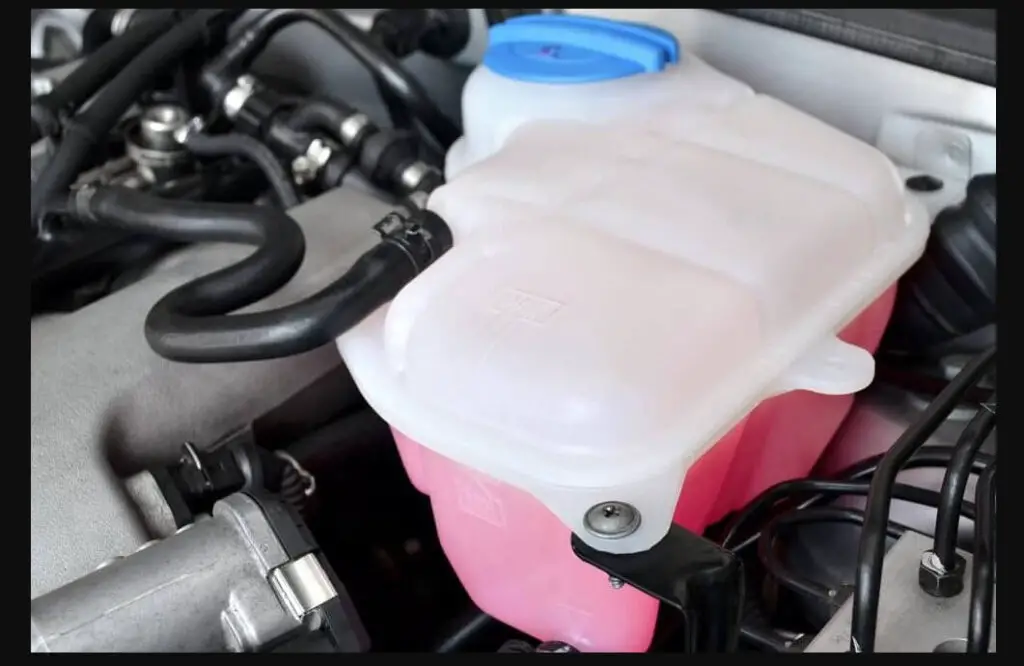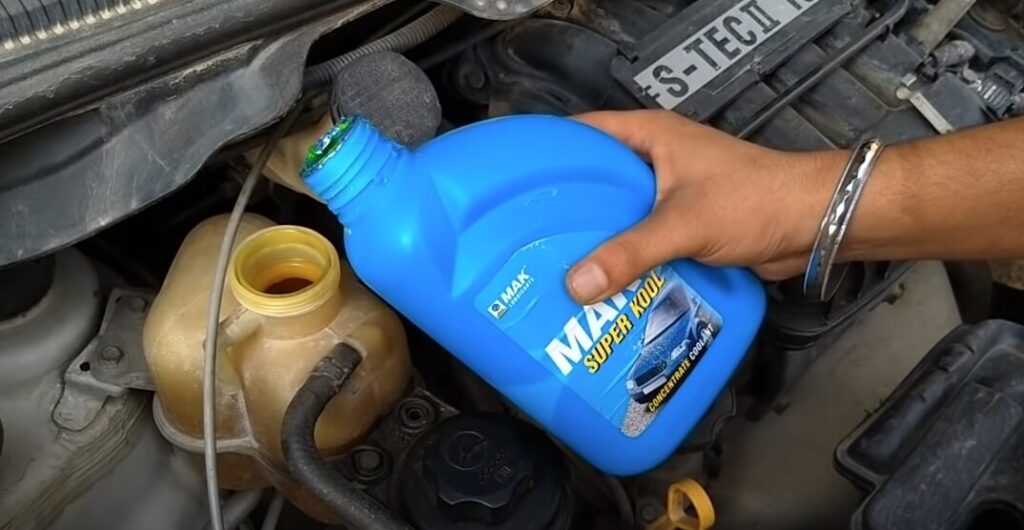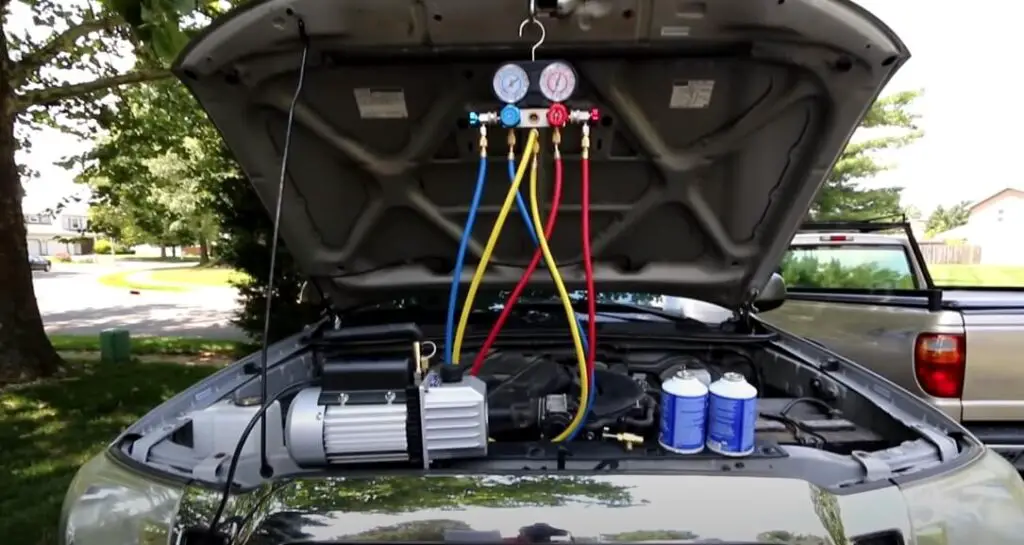Yes, coolant is an essential component for the proper functioning of an air conditioning (AC) system. Coolant, also known as refrigerant, is a substance that absorbs heat from the indoor air and releases it outside, allowing the AC system to cool the air effectively. It undergoes a continuous cycle of compression and expansion, which facilitates heat transfer.
If your AC is not providing sufficient cooling or is not cooling at all, it is possible that the coolant level is low. In such cases, adding coolant to the system can help restore its cooling capacity.
However, it’s important to note that refrigerant should not be added without diagnosing and addressing the underlying cause of the low coolant level. Refrigerant does not get used up or dissipate over time unless there is a leak in the system, so a low coolant level indicates a potential leak that needs to be fixed.

Will coolant fix my ac?
Simply adding more coolant to an AC system is unlikely to fix the underlying issue causing the problem.
AC systems are complex, and there can be several reasons why your AC is not working properly. Some common issues include refrigerant leaks, compressor problems, faulty electrical components, or blockages in the system.
Signs of low coolant in car ac
If you notice any of the following signs, your car’s coolant level may be low and you should check it as soon as possible:
1. The temperature gauge on your dash is reading higher than normal.
2. There is steam coming from under the hood.
3. The engine is overheating.
4. The car is leaking coolant.
5. The car’s heater is not working as well as it should.
If you notice any of these signs, don’t delay in checking your car’s coolant level and topping it off if necessary. A bit of preventative maintenance can save you a lot of headaches down the road.
How to add coolant to car ac?
Here is a general overview of the steps involved in how to put coolant in a car’s air conditioning system:
- Safety precautions: Ensure you have the necessary personal protective equipment (PPE) such as gloves and safety glasses to protect yourself during the process.
- Locate the low-pressure port: The low-pressure port is typically located on the larger diameter tubing of the air conditioning system. It is usually labeled with an “L” or “LOW.” Refer to your vehicle’s manual or consult a repair guide for the specific location.
- Prepare the refrigerant: If you are using a commercially available refrigerant kit, follow the instructions provided to prepare the canister. Some kits may require shaking or other preparation steps.
- Connect the refrigerant canister: Attach the hose from the refrigerant canister to the low-pressure port. Make sure the connection is secure.
- Monitor the system: If your kit includes a pressure gauge, you can monitor the pressure in the system. It’s essential to follow the manufacturer’s instructions and guidelines for the specific kit you are using.
- Add the refrigerant: Slowly open the valve on the refrigerant canister to allow the coolant to enter the system. Follow the instructions provided with the kit to determine the appropriate amount to add. Be cautious not to overcharge the system, as it can lead to damage.
- Monitor the system and check for leaks: While adding refrigerant, observe the pressure gauge (if available) and monitor the system for any signs of leaks, such as hissing sounds or refrigerant odor. If you detect any leaks, it’s crucial to stop the process and have the system inspected by a professional.
- Close the valve and disconnect: Once you have added the appropriate amount of refrigerant, close the valve on the canister. Disconnect the hose from the low-pressure port carefully.
Remember, this is a simplified overview of the steps involved, and it’s strongly advised to seek professional assistance for this task. Adding coolant to a car’s air conditioning system requires knowledge, experience, and specialized equipment to ensure proper charging and safety.

Antifreeze for air conditioner
As the weather starts to warm up, you may be thinking about getting your air conditioner serviced. Part of that service may include topping off the antifreeze. But what exactly is antifreeze and why do you need it in your air conditioner?
Antifreeze is a glycol-based liquid that is used to absorb heat. It helps to keep your air conditioner running efficiently by preventing the formation of ice on the coils. When ice forms, it can reduce the airflow and cause the unit to work harder to cool the air.
Topping off the antifreeze in your air conditioner is a simple process. Your technician will just need to remove the access panel and add the antifreeze through the opening. They will then replace the access panel and test the unit to make sure it is running properly.
If you are unsure about whether or not your air conditioner needs antifreeze, be sure to ask your technician. They will be able to check the levels and top off the unit if necessary.
Does antifreeze run through ac compressor?
No, antifreeze does not run through the AC compressor. Antifreeze, also known as coolant, is a liquid used in the engine cooling system of a vehicle to maintain the optimal operating temperature. It circulates through the engine and radiator to remove excess heat.
The AC compressor, on the other hand, is part of the vehicle’s air conditioning system. It is responsible for compressing and circulating refrigerant, which is a separate substance from antifreeze. The refrigerant absorbs heat from the air inside the vehicle, cools it, and then releases the heat outside. This process allows the air conditioning system to provide cool air.
So, while both the engine cooling system and the air conditioning system are important for maintaining a comfortable driving environment, antifreeze and refrigerant are two distinct substances that serve different purposes and do not mix with each other.

Coolant loss with ac on
If you’ve ever turned on your car’s air conditioning only to have the coolant level drop alarmingly low, you’re not alone. This is a common problem, and one that can be easily fixed. The most likely cause of coolant loss with the AC on is a leak in the AC system.
The AC system is sealed, so if there is a leak it will be evident by coolant dripping from the AC compressor.
In most cases, the leak will be at one of the AC hoses that connects the compressor to the evaporator. If you suspect a leak, the best thing to do is take your car to a qualified mechanic who can check for leaks and repair them.
In some cases, the entire AC system may need to be replaced. In the meantime, you can keep your car’s coolant level topped up by adding a 50/50 mix of water and coolant to the radiator.
This will help to prevent your engine from overheating, and will buy you some time until you can get the AC system repaired.
Is coolant the same as freon?
No, coolant is not the same as freon. Freon is a brand name for a group of gases used as refrigerants, while coolant is a liquid or gas that is used to cool down a system.
Does coolant run through ac condenser?
The condenser in your car’s air conditioning system is responsible for cooling the refrigerant that runs through it. In order to do its job effectively, the condenser must be cooled by a flow of air.
This is why you’ll often see fans mounted on or near the condenser – they’re there to help keep the air moving over the condenser coils.
In some cases, the air that flows over the condenser coils may not be enough to keep the refrigerant cool. In these cases, you may need to add a coolant to the system. This coolant will flow through the condenser coils and help to keep the refrigerant cool.
If you’re not sure whether or not your car’s air conditioning system needs a coolant, it’s best to consult a professional. They will be able to diagnose the problem and recommend the best course of action.
Low coolant ac
If your car’s air conditioner is blowing warm air, it could be a sign that your coolant is low. Low coolant can cause your car to overheat, which can lead to engine damage. There are a few things that can cause your coolant to become low.
A leak in your cooling system is the most common cause. A leak can happen anywhere in the system, including the radiator, hoses, or water pump. A leak can also happen if the radiator cap is not sealing properly.
If you think you might have a leak, it’s important to get it fixed as soon as possible. You can take your car to a mechanic to have it checked out, or you can check it yourself. To check for a leak, you’ll need to look for signs of coolant around the engine bay.
When you see coolant, it’s a good indication that there’s a leak. Once you’ve found the leak, you’ll need to get it fixed. You can either replace the part that’s leaking or have it repaired.
If you have a small leak, you may be able to temporarily fix it with a sealant. If your coolant is low, it’s important to add more as soon as possible. You can buy coolant at most auto parts stores.
Be sure to check your owner’s manual to find out what type of coolant is best for your car.
Coolant leak ac not working car
If your car’s air conditioner isn’t working, there’s a good chance that it’s because of a coolant leak. When coolant leaks from the AC system, it not only prevents the system from working properly, but it can also damage other parts of the car. If you think you may have a coolant leak, it’s important to take your car to a mechanic as soon as possible to have it fixed.
Here’s what you need to know about coolant leaks and AC systems. When coolant leaks from the AC system, it can cause the system to stop working properly. The coolant is responsible for keeping the AC system cool, so when it leaks out, the system can’t function properly.
In addition to causing the AC system to stop working, coolant leaks can also damage other parts of the car. The coolant can damage the car’s paint, and it can also cause corrosion. If you think you may have a coolant leak, it’s important to take your car to a mechanic as soon as possible.
The mechanic will be able to check for leaks and repair any that are found. Once the leaks are repaired, the AC system should start working properly again. If your car’s air conditioner isn’t working, there’s a good chance that it’s because of a coolant leak.
Does your coolant affect your AC?
If you’ve ever wondered whether your coolant affects your AC, the answer is yes! Coolant, also known as antifreeze, helps to keep your engine cool and operating at its best. But did you know that it can also affect your AC system?
When your engine is running, the coolant helps to keep it cool. But the AC system also uses coolant to help keep the cabin of your car cool. So, if your coolant is low, it can affect how well your AC system works.
If you notice that your AC isn’t blowing as cold as it used to, it could be a sign that your coolant level is low.
Be sure to check your coolant level regularly and top it off if needed. This will help keep your engine and AC system operating at their best.
Does coolant help cool your car?
Your car’s cooling system is vital to keeping your engine from overheating. The main component of the cooling system is the coolant, a mixture of water and antifreeze. The coolant flows through the engine, absorbing heat from the engine, and then flows through the radiator where it is cooled by the air flowing through the radiator.
The coolant helps to keep the engine at a constant temperature, even when the engine is under a heavy load or when the outside temperature is very hot. This is important because if the engine gets too hot, it can be damaged. The coolant also protects the engine from corrosion.
The water in the coolant evaporates over time, and the antifreeze helps to prevent the engine from rusting. To sum it up, the coolant is vital to the proper functioning of your car’s cooling system.
It helps to keep the engine at a constant temperature, and it protects the engine from corrosion.
Does car AC need coolant?
If your car’s air conditioner isn’t working, one possible cause is a lack of coolant. The air conditioner relies on a chemical called Freon to cool the air, and if there’s not enough of it, the system can’t do its job.
Adding coolant to the air conditioner is a relatively simple process, but you’ll need to take your car to a mechanic to do it.
They’ll need to hook up a special machine to the car’s AC system and add the coolant, making sure not to overfill it. If your car is low on coolant, it’s best to get it checked out by a mechanic as soon as possible. Otherwise, you could end up stranded on a hot day with no way to keep cool.
Water vs Coolant Temperature Test. Which One is Better
Can I put antifreeze in my engine coolant?
No, you should not put antifreeze directly into your engine coolant. Antifreeze is actually designed to be mixed with water to create engine coolant.
Engine coolant, also known as antifreeze, is a mixture of antifreeze and water that circulates through your engine to help regulate its temperature. It helps prevent freezing in cold temperatures and overheating in hot temperatures. The proper ratio of antifreeze to water is typically 50:50, although this can vary depending on the climate and the specific recommendations of your vehicle’s manufacturer.
Does a coolant leak affect air conditioning?
Yes, a coolant leak can affect the performance of an air conditioning system. The coolant, also known as refrigerant, is responsible for absorbing heat from the air and cooling it down. If there is a leak in the coolant lines, it can lead to a decrease in the refrigerant level.
When the refrigerant level is low, the air conditioning system may not be able to effectively cool the air. This can result in reduced cooling capacity, longer cooling times, or even complete failure of the system to produce cold air.
In addition, low refrigerant levels can put extra strain on the compressor, potentially leading to compressor failure if the issue is not addressed.
Does coolant have anything to do with ac?
Yes, coolant plays an important role in the functioning of an air conditioning (AC) system. In an AC system, the coolant, also known as refrigerant, is responsible for absorbing heat from the indoor air and releasing it to the outdoor environment, resulting in cooling the air inside a building or a vehicle.
The coolant circulates through a closed loop in the AC system, undergoing phase changes from a gas to a liquid and vice versa.
As it passes through various components, such as the compressor, condenser, expansion valve, and evaporator, it undergoes these phase changes, facilitating heat transfer.
Can radiator leak cause ac to not work?
Yes, a radiator leak can potentially cause the air conditioning (AC) system to malfunction or not work properly. Although the radiator and AC system are separate components in a vehicle, they are connected through the cooling system.
The cooling system helps regulate the engine temperature by circulating coolant through the engine and radiator. If there is a leak in the radiator, coolant may be lost, leading to insufficient coolant levels in the system. This can result in the engine overheating, which in turn can affect the performance of the AC system.
Can a coolant leak cause ac to not work?
Yes, a coolant leak can definitely cause the air conditioning (AC) system to not work properly. The AC system relies on refrigerant, a type of coolant, to remove heat from the air and cool the interior of a vehicle or a building.
If there is a coolant leak in the AC system, it can result in a loss of refrigerant. As a result, the AC system may not be able to effectively cool the air, or it may not produce cold air at all. The lack of refrigerant can lead to reduced cooling performance or complete AC system failure.
Do antifreeze and coolant go in the same place?
Antifreeze and coolant are often used interchangeably. But technically, antifreeze refers to the chemical component that prevents freezing and lowers the freezing point of a liquid, while coolant is the entire mixture of antifreeze and water used to regulate the temperature in an engine.
In most vehicles, the coolant/antifreeze mixture is added to the radiator through a designated filler cap or overflow reservoir. The exact location may vary depending on the vehicle make and model, so it’s important to consult your vehicle’s owner’s manual for the specific instructions.
Conclusion
If your car’s air conditioner isn’t cooling as well as it used to, you might be tempted to add some coolant. But unless you know what you’re doing, this isn’t a good idea. Coolant can be dangerous if it’s not handled properly, and it’s best to leave it to the professionals.